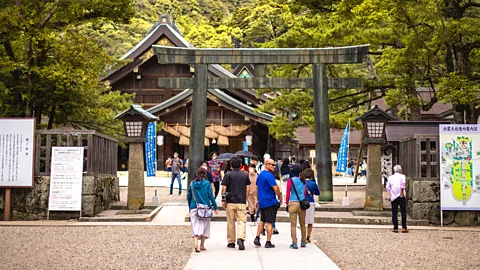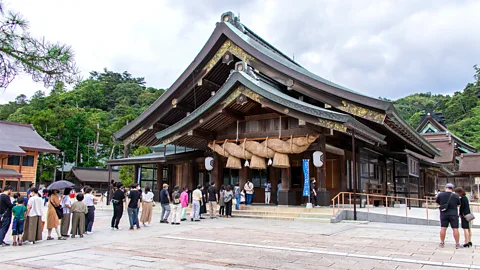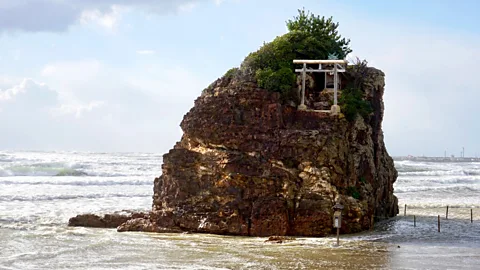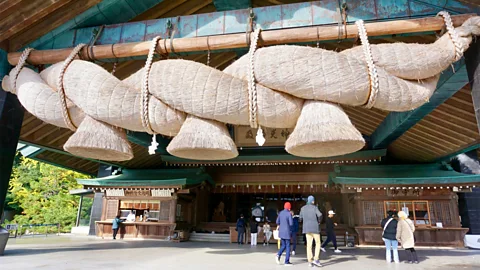Looking for a match made in heaven? This Japanese city is for people seeking love
 Getty Images
Getty ImagesIf you pray for love in Izumo, there's a good chance you'll be heard. Every year, eight million gods gather in this seaside city to decide the fate of humans' relationships.
The romance of air travel still exists. At least that's the impression when you land at Japan's auspiciously named Izumo Enmusubi Airport. Translating roughly to "the tying (musubi) of bonds (en)", or, more popularly, "matchmaking", the word enmusubi encompasses many of the relationships that are part of life, such as those with family, friends and work, but most often references romantic entanglements. This connotation is in the air as you step off the plane and walk past a statue of a jovial god named Okuninushi, known as the "great matchmaking power", and a rack of ema (wooden prayer plaques) inscribed with travellers' romantic wishes.
It may seem like travellers here have love on the mind, and that's because if you pray for love in Izumo, there's a good chance you'll be heard.
Lying along the Sea of Japan in Shimane, the second-least populated of Japan's prefectures and, in 2023, the least-visited, Izumo is far off the Shinkansen bullet train track, making it one of the few cities in Japan that is easier to fly into. The city is home to Izumo Taisha, thought to be the country's oldest shrine and dedicated to Okuninushi, who is worshipped as the creator of Japan and the god of enmusubi in Japan's indigenous Shinto religion.
"He is the god who governs things that cannot be seen by humans", such as fate, explained local guide Minori Maeda, "You could say he is the god of matchmaking. He brings people together; he has tremendous power."
That's why Izumo Taisha has become popularly known as one of Japan's "power spots", a term that emerged in the 1990s to describe places, usually surrounded by nature, that are said to possess special powers to generate good luck, better health or, in this case, love. While the philosophy of power spots is a fuzzy grab bag of Shintoism, new age spirituality, feng shui and marketing, its popularity over the last few decades has increased tourism to places like Izumo. More than seven million people visited the shrine in 2023, according to Izumo City, including around 350 couples who got married there.
 Getty Images
Getty ImagesCertainly not everyone who visits Izumo does so in pursuit of love, but the number of matchmaking-related activities here suggest a fair number do. With this in mind, tourism boards have compiled sightseeing itineraries focused on romantic spots in Izumo and the wider San'in region, from Yaegaki Shrine where a pond forecasts the outcome of relationships, to a pleasure boat whose bronze "matchmaking bell" summons the gods and even a train station painted pink and adorned with hearts. Less widely promoted is Izumo's Umi Shrine, which people visit to pray for enriki, the severing of ties, the other side of the enmusubi coin.
Set on an often tempestuous sea and a place of sunsets so stunning that they are certified by Japan Heritage as an important cultural property, Izumo is romantic by nature. But nowhere exerts such a mighty pull as Izumo Taisha. Singles visit to ask Okuninushi to find them a partner, while couples ask him to bless their relationship. Many write their wishes on an ema in the faith that they will reach Okuninushi directly.
Some, perhaps seeking a larger audience, time their trip to the 10th month of Japan's old lunar calendar (usually November), because that's when Japan's eight million kami (gods and spirits) travel from all around the country to gather in the city. Throughout Japan, this month is known as Kan-na-dzuki (the month without gods), but in Izumo it's called Kami-ari-dzuki (the month with gods). The reason for this seaside gathering is that the gods have a job to do: they are there to decide the fate of humans' relationships in the coming year.
The seven-day gathering of the gods (11-17 November 2025) is a spectacle in its own right. It begins on the beach at Inasa-no-Hama with a ceremony welcoming the kami to Izumo. Just after sunset, bonfires are lit and shrine priests escort the kami to Izumo Taisha, shielding them from the gathered public's view with white sheets. It's not all work and no play, said Maeda. The kami also enjoy feasts and lots of sake offered up by local brewers. A handful of those eight million kami enjoy the local sake a little too enthusiastically and hang around well beyond their official departure date. "There's a goddess who is known for her persuasiveness," Maeda said. "She eventually has to perform a ceremony telling them that they have to go home."
 Karen Gardiner
Karen GardinerI visited Izumo a few days after (most of) the kamis' departure in late November last year. I hadn't arrived looking for love, rather to sip sake in the place said to be its spiritual birthplace and explore the rugged coastline's cliffs and caves. But, still, I felt compelled to visit Izumo Taisha. Approaching the altar under a huge shimenawa (rope), I dropped a five-yen coin into the offering box – five yen ("go-en") is thought to be good luck because in Japanese, go en is a homophone with go-en, the respectful way to refer to "en" (bonds). Then I clapped four times, twice for myself and twice for my partner, the custom distinct from other Shinto shrines where worshippers clap just twice. After silently making my own wish, I browsed the amulets on sale. Maeda said the red-and-white amulet is particularly well known, "for bringing people together in love". Then I peeked at some of the handwritten wishes inscribed on the ema hanging along the shrine's pathways. "It's said that writing your wishes on an ema will ensure that [they] reach the gods directly," said Maeda. Some of those written wishes asked to simply find love, others were more specific, requesting to "get married within three years".
The eagerness of visitors' desire to get married felt like a counterpoint to Japan's much-publicised plummeting marriage rates. In the same month that I visited Izumo, the Tokyo government, in an effort to nudge residents towards marriage and stem the city's falling birthrate, launched a matchmaking app, aptly named Tokyo Enmusubi. But I'd just read of travel trends suggesting that people are tired of looking for love online. Could they ignore the apps and look to the heavens instead, I wondered, and, if so, is a degree of belief in higher powers required?
"Whether they believe or not is beside the point," said Tokyo-based author Hiroko Yoda, whose book about Japanese spirituality, Eight Million Ways to Happiness: Wisdom for Inspiration and Healing from the Heart of Japan, will be published in December 2025.
"Unlike the West, "belief" or "disbelief" doesn't really factor into Japanese spirituality," she explained. "People go to Izumo Taisha because it is famous or because they feel a personal need, or simply because they want to check it out. There's no recruiting or evangelising or claims of power." As for choosing between praying for love and downloading a matchmaking app, you can do both, Yoda added: "Japanese spirituality embraces rather than rejects."
 Karen Gardiner
Karen GardinerYoda considers Izumo Taisha's image as a sacred matchmaking spot to be largely the product of tourism marketing; when I hear the word 'power spot', I always roll my eyes," she says. But she also believes that there's a "spiritually playful aspect" to its promotion, which the flexibility and inclusivity of Japanese spirituality allows for. "In Japan, religions are not based in dogma. They co-exist with modern society," she said.
Go to Izumo to pray for a partner but do so with the awareness that "Izumo Taisha's offering of connection goes far beyond that of finding your romantic match", Yoda says, reinforcing the widely inclusive meaning of enmusubi. "It's about the invisible web of metaphorical threads that bring us together for all sorts of things, in all spheres of life, in ways unpredictable and unexpected, wondrous and wonderful."
--
If you liked this story, sign up for The Essential List newsletter – a handpicked selection of features, videos and can't-miss news, delivered to your inbox twice a week.
